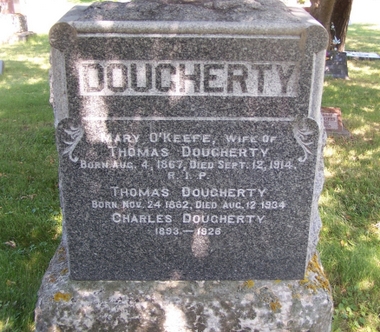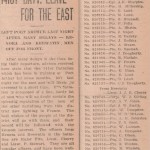

| Personal Details | |
| Date of Birth | April 8, 1892 |
| Place of Birth | Kenora, Ontario |
| Country | Canada |
| Marital Status | Single |
| Next of Kin | Thomas Dougherty (father), Kenora, Ontario |
| Trade / Calling | Switchman (Railroad) |
| Religion | Roman Catholic |
| Service Details | |
| Regimental Number | 821121 |
| Service Record | Link to Service Record |
| Battalion | 52nd Battalion |
| Force | Canadian Expeditionary Force |
| Branch | Canadian Infantry |
| Enlisted / Conscripted | Enlisted |
| Address at Enlistment | Kenora, Ontario |
| Date of Enlistment | March 4, 1917 |
| Age at Enlistment | 24 |
| Theatre of Service | Europe |
| Prisoner of War | No |
| Survived War | Yes |
| Death Details | |
| Date of Death | 19260116 |
| Age at Death | 33 |
| Buried At | Lake of the Woods Cemetery, Kenora, Ontario |
| Plot | RC C - 21 - 20 |
Dougherty, Charles James
Corporal Charles James Dougherty was the son of Thomas Arthur and Mary Dougherty of Kenora, Ontario. Thomas was born in Philadelphia, Pennsylvania and his wife Mary (née O’Keefe) was from Lacrosse, Wisconsin. They moved to Canada around 1887, settling in the small town of Rat Portage about four years later. They had five children, three sons and two daughters: Thomas Jr. (1889), Frances (1891), Charles James (8 April 1892), William Edward (1893) and Ethel (1895). The three youngest children were born in Rat Portage (now called Kenora), where Thomas worked for the Canadian Pacific Railway, first as a brakeman and later as a conductor. Charles’ mother passed away in September 1914, at age 47. She’d been suffering from ill health and she went into St. Joseph’s Hospital for an operation and never recovered.
The war started in August 1914 and Charles and his brother William Edward both enlisted. William was living in Souris, Manitoba where he worked for the CPR and he joined the 79th Battalion in Brandon in April 1916. Charles signed up next, enlisting with the 141st (Bull Moose) Battalion in Fort Frances on 4 March 1917. He was 25 years old and his occupation was railroad switchman. The 141st was being recruited in the District of Rainy River and most of the volunteers had been training in Port Arthur over the winter. Charles joined them in time to head east with the battalion when it left Port Arthur on 21 April 1917. From the Kenora Miner and News, ‘The Battalion is composed of a fine, hardy lot of men who will no doubt sustain the splendid reputation of the men of the other battalions from this district now fighting in France. The best wishes of the people of the district will go with them, and their record will be followed with keenest interest.‘ A week after leaving Port Arthur the men embarked from Halifax on the SS Olympic. In England the 141st was absorbed into the 18th Reserve Battalion and the recruits were used as reinforcements to replace casualties in front line units.
After training over the summer Charles was transferred to the 52nd (New Ontario) Battalion and sent to France, joining his new unit in the field in late September 1917. He was in the hospital in October with a painful foot problem. In November he forfeited two weeks pay for drunkenness and in December he had a week of Field Punishment No. 1 for being absent without leave. In March 1918 he had two weeks leave in the UK and following that he had more disciplinary action for further cases of drunkenness and being absent without leave. Charles spent several months with machine gun units and he was back with the 52nd Battalion on 9 July 1918. At the end of July he faced more serious trouble when he was imprisoned to await trial. The charge was ‘committing an offence against the person of an inhabitant of the country in which he is serving.’ He was found guilty and sentenced to six months in prison with hard labour.
In February 1919 Charles became ill with both vd and influenza and he spent about five weeks at the Canadian Special Hospital in Witley, Surrey. Following his recovery the balance of his sentence was remitted and his last few months were served with the 18th Reserve Battalion. He embarked for Canada on 14 June 1919 and he was discharged on 23 June in Port Arthur.
After the war Charles lived in Kenora for a few years before moving to the Niagara region in southeastern Ontario, where he worked in construction. In December 1925 he became ill and his family brought him home to Kenora to recover. His health seemed to improve but then he had a relapse. He passed away in St. Joseph’s Hospital on 16 January 1926, at age 33, suffering from influenza and ‘weak heart disease.’ Charles’ funeral was held two days later and he’s buried in the Catholic section of Lake of the Woods Cemetery in Kenora.
Thomas Sr. survived his wife by twenty years and he died in Kenora in August 1934, at age 72. Thomas and Mary are both buried in Lake of the Woods Cemetery, sharing a grave marker with their son Charles.
By Becky Johnson





